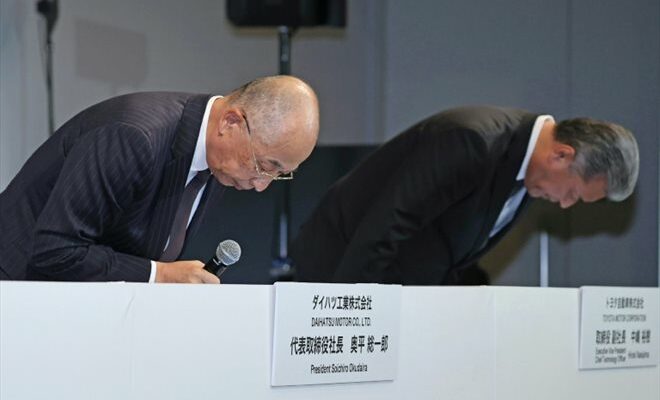A vehicle from the manufacturer Daihatsu, in the streets of Tokyo, September 3, 2017 (AFP/Archives/Toshifumi KITAMURA)
Japanese car manufacturer Daihatsu, a subsidiary of Toyota, took the radical decision on Wednesday to suspend deliveries of all of its models after an independent investigation identified numerous facts of “falsification” of its safety tests.
Daihatsu admitted last April and May to having tampered with crash test results of certain models, and an independent commission was set up to investigate in order to “fully clarify the nature of the irregularities and identify their root cause”.
According to its report made public on Wednesday, and which was submitted to the Japanese Ministry of Transport, the investigation identified 174 irregularities among 25 categories of tests, the oldest of which date back to 1989.
These irregularities concern a total of 64 vehicle models – including models that are no longer produced – including models manufactured on behalf of Toyota, Mazda and Subaru.
Daihatsu, specialist in mini-vehicles very popular in Japan called “kei cars”, a market of which it holds around 30%, presented its “most sincere apologies” to its customers for having “betrayed their trust”. It decided “to temporarily suspend deliveries of all models developed by Daihatsu and currently in production in Japan and abroad.”
– “No failure would be forgiven” –

Daihatsu President Soichiro Okudaira during a press conference in Tokyo on December 20, 2023, regarding the falsification of the Japanese manufacturer’s safety tests (JIJI Press/AFP/STR)
As certification is a “major prerequisite” for an automaker to operate, “our poor conduct amounts to disregard” for this process, Daihatsu President Soichiro Okudaira told a news conference on Wednesday. , before bowing deeply.
In its report, the group of independent experts blames Daihatsu’s faults on factors such as “extreme pressure due to an excessively tight and rigid development schedule” and lack of expertise among management.
The personnel responsible for the safety tests “were under great pressure to pass them” because “the number of test vehicles available was limited to reduce costs”, detailed the president of the commission of inquiry Makoto Kaiami before the journalists on Wednesday.
“The prevailing mindset was that no failure would be forgiven,” he added.
According to public broadcaster NHK, the Japanese Ministry of Transport is due to carry out an inspection at Daihatsu’s premises on Thursday to try to confirm the facts recorded in the report.
– “Extreme gravity” –
Toyota itself expressed in a separate statement its “sincere apologies for the inconvenience and concern that this situation has caused”, and also announced that it would suspend delivery of affected models.

Daihatsu President Soichiro Okudaira and Toyota Vice President Hiroki Nakajima during a press conference in Tokyo on December 20, 2023, regarding the tampering of Daihatsu safety tests (JIJI Press/AFP/ STR)
The purpose of the checks is to verify “that vehicles meet different standards so that customers can drive their vehicle with complete peace of mind” and are “an essential prerequisite for operating as a car manufacturer,” Toyota said.
“The extreme seriousness” of Daihatsu’s “negligence in the certification process has shaken the very foundations of the company as an automobile manufacturer,” he added.
“To prevent this from happening again (…) fundamental reform is necessary to revitalize Daihatsu as a company”, and it will be necessary “not only to review the management and business operations, but also the organization and structure ” of the company, judged Toyota.
The automobile giant was already splashed last year by a scandal over inappropriate tests on the engines of truck manufacturer Hino, of which it is a majority shareholder.
Daihatsu produced more than 1.7 million vehicles worldwide in the 2022/23 financial year ended at the end of last March, around half of which were in Japan. It makes most of its sales in the archipelago and in South-East Asia.
Founded in 1907 to manufacture internal combustion engines, the company based in Osaka (western Japan) launched its first three-wheeled vehicle in 1931. In 1967 it came under the control of Toyota.
© 2023 AFP
Did you like this article ? Share it with your friends using the buttons below.




